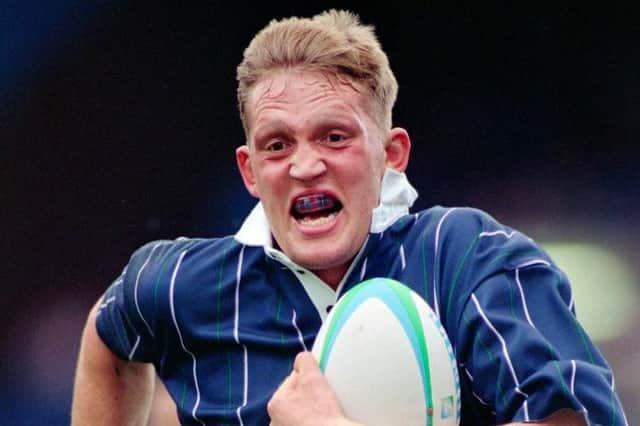Scotsman Obituaries: Doddie Weir, Scottish rugby legend and MND campaigner


With the death of Doddie Weir, Scotland has lost a much-loved sporting hero, those affected by Motor Neurone Disease (MND) have lost a remarkable champion for their cause, and family and friends a truly wonderful man. He was a national treasure, a status earned through a combination of his achievements as an international rugby player and the admiration he attracted for the uncomplaining way he dealt with his MND diagnosis and the marvellous work of his charity, the My Name’5 Doddie Foundation.
A striking fair-haired, initially skinny, figure at 6ft 6in tall, his on-field image was enhanced by legendary commentator Bill McLaren’s description of him as being “on the charge like a mad giraffe”. But he had athleticism aplenty, and was an outstanding lineout player blessed with superb hands. Off the field, his ready smile, gregarious personality and sense of humour – along with a penchant for outrageous tartan suits – endeared him to the wider public via media appearances and speaking engagements.
Advertisement
Hide AdAdvertisement
Hide AdWho can forget how during a televised media training exercise before going with the British and Irish Lions on their 1997 tour of South Africa, he responded to an accusation of being in a nightclub beyond curfew with the deadpan: "Mistaken identity.” While sometimes he may have encouraged a “big daft laddie” demeanour, he was deadly serious on the rugby pitch during a lengthy career which straddled the amateur and professional eras, winning 61 caps for Scotland and a place on that Lions tour.


Later, when afflicted by MND, he demonstrated that same serious resolve as he challenged the condition, determined to lead as full a life as possible.
George Wilson Weir was born to John and Margaret. The eldest of four children, he was brought up along with Kirsty, Thomas and Christopher on the family farm at Cortleferry near Stow in the Borders. He went to Fountainhall primary, with a total roll of 26 pupils, before moving to the far bigger Stewart’s Melville College in Edinburgh, which required some adjustment. Soon he began making his mark at rugby although his first sporting love was horses – he competed successfully in various equestrian activities. That involvement resonated in his future rugby career as a fellow member of the Buccleuch Pony Club suggested a 14-year-old Doddie train with Melrose Rugby Club colts on Sundays, initiating a lifelong association with the club.
Although his father had played for Gala, as his brothers would do, Doddie instead joined their close rivals and met Jim Telfer, the man he principally credited with his rugby success. Meanwhile his school rugby career flourished in the 1st XV at Stewart’s Melville, with him being selected to represent Scottish Schools against British counterparts before, in 1988, going on what he later described as “the trip of a lifetime”, a tour of New Zealand. Staying with local families, seeing the sights and playing memorable matches was an unforgettable experience.
Two years later he had to pinch himself as he again toured New Zealand, this time as a member of the full Scotland squad.
After leaving school he undertook an HND in agriculture in Edinburgh and began playing senior rugby with Melrose, earning a Scotland ‘B’ cap in 1989 before making his full international debut in 1990 aged 20 against Argentina; his 61st and final cap came against France in March 2000. Most of his appearances saw him play at 2nd row forward.
At club level highlights included winning five League Championships with Melrose and a coveted Melrose ‘7’s medal for Co Optimists, while with Newcastle in the professional era he won an English League title and the national Cup competition, the latter as captain, ending his career with Borders Reivers. Doddie also represented the Barbarians six times.
Internationally, he played in three World Cups including a semi-final in 1991 against England and quarter final against New Zealand in 1995, when he became the first Scot to score two tries against the All Blacks. Doddie shared in the last Five Nations title won by Scotland but his Lions tour was cut short when he was badly injured in his third match by foul play, having been considered a “real contender” for a Test place.
Advertisement
Hide AdAdvertisement
Hide AdAlthough committed to the professional game his heart was probably more in the amateur era when rugby was not so all consuming. In 2019 he was awarded an OBE by the Queen for services to rugby, MND research and the Borders community; in 2020 he was inducted into Scottish Rugby’s Hall of Fame; and in 2021 he was appointed Honorary Joint President of his beloved Melrose. Once retired from playing Doddie was director of a family waste management company and later operated a farm near Blainslie in the Borders.
At Christmas 2016 Doddie was diagnosed with MND, with a probable maximum life expectancy of two years. It is testament to his fortitude and mindset in challenging the condition that he lived considerably longer. He was appalled that there was no cure for the condition and disappointed at the lack of support for sufferers. With the help of rugby friends and others he set up his charity, which has raised over £8 millionto progress research towards a cure. Campaigners have persuaded the government to set aside £50 million for research.
His pragmatic approach to dealing with his plight –“you’ve just got to get on with things” – while heralding the cause of others earned widespread praise. His wife Kathy, whom he wed in 1997, and their three sons, Hamish, Angus and Ben, along with family and friends have been hugely supportive.
Doddie Weir is survived by his wife, sons, father and brothers.
Obituaries
If you would like to submit an obituary (800-1000 words preferred, with jpeg image), or have a suggestion for a subject, contact [email protected]
Subscribe
Subscribe at www.scotsman.com/subscriptions
Comments
Want to join the conversation? Please or to comment on this article.